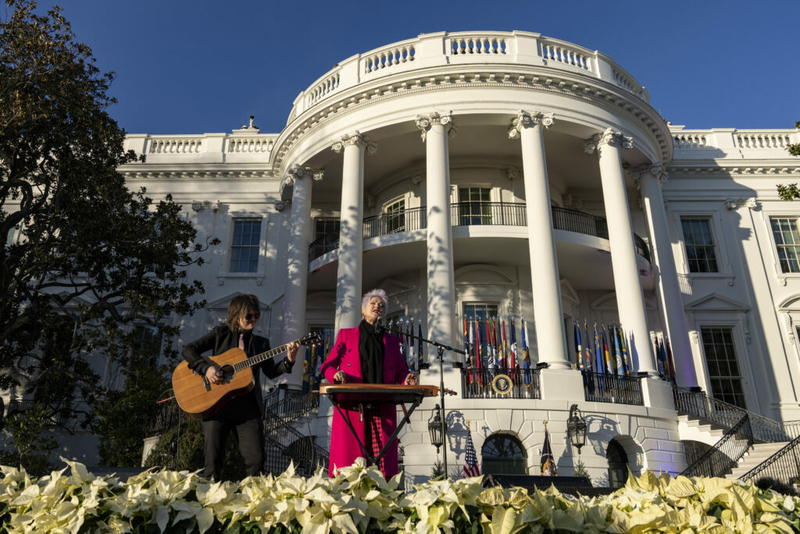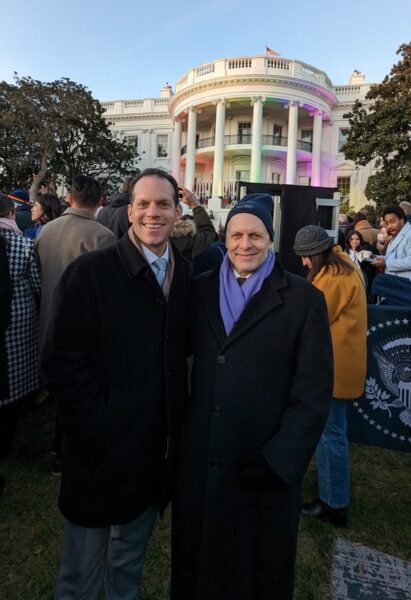Biden signs law extending marriage protections to same-sex and interracial couples

Same-sex and interracial couples had many of their marriage rights codified Tuesday when President Biden signed the bipartisan marriage equality bill during a ceremony attended by thousands outside the White House.
In a brief speech, Biden told supporters on the South Lawn that “marriage is a simple proposition — who do you love and will you be loyal to that person you love.”
“It’s not more complicated than that and the law recognizes that everyone should have the right to answer those questions for themselves without government interference,” he continued.
Biden used the celebratory signing ceremony to address the November mass shooting at an LGBTQ nightclub in Colorado Springs, as well as other incidences of discrimination and violence, urging Americans to speak out.
“We must stop the hate and violence, like we just saw in Colorado Springs, where a place of acceptance and celebration was targeted for violence and terror,” Biden said. “We need to challenge the hundreds of callous and cynical laws introduced in the states, targeting transgender children, terrifying families and criminalizing doctors who give children the care they need.”
Biden said that racism, antisemitism, homophobia and transphobia are all connected. “But the antidote to hate is love,” Biden said, adding the marriage equality law “and the love it defends, strike a blow against hate in all its forms.”
The law ensures that if the U.S. Supreme Court were to overturn the cases that legalized same-sex and interracial marriages, the federal government and states would continue recognizing those unions.
Such a move by the conservative-leaning court, however, would send the issue of marriage back to the states, many of which still have laws on their books classifying the marriages as illegal. That would mean couples in especially conservative states might once again have to travel to marry, though their home state and the federal government would be required to recognize their marriages under the new law.
Spurred by Thomas opinion
The bill began moving through Congress this summer after the U.S. Supreme Court overturned the two cases that recognized abortion as a constitutional right for nearly half a century.
Associate Justice Clarence Thomas, in his concurring opinion in the abortion case, stoked concerns from LGBTQ rights organizations when he wrote that the court should reconsider all of its “substantive due process precedents, including Griswold, Lawrence, and Obergefell.”
Those cases — Griswold v. Connecticut, Lawrence v. Texas and Obergefell v. Hodges — recognized the constitutional right for married couples to determine if and when to use contraceptives, prevented the government from criminalizing adult private consensual sexual relationships and legalized same-sex marriages.
Biden brought up Thomas’ opinion during Tuesday’s ceremony, saying “when a person can be married in the morning and thrown out of a restaurant for being gay in the afternoon, this is still wrong.”
The signing Tuesday featured performances from artists Sam Smith and Cyndi Lauper, creating a celebratory atmosphere.

Montgomery County Council President Evan Glass (left) and Somerset Mayor Jeffrey Slavin at the White House bill-signing ceremony Wednesday. Photo courtesy of Evan Glass.
Several Maryland political leaders were on hand, including U.S. Sen. Chris Van Hollen (D), Montgomery County Council President Evan Glass (D), state Sen. Mary Washington (D-Baltimore City), Dels. Bonnie Cullison (D-Montgomery), Anne Kaiser (D-Montgomery), Luke Clippinger (D-Baltimore City), Maggie McIntosh (D-Baltimore City), Lisa Belcastro (D-Baltimore County), and Somerset Mayor Jeffrey Slavin.
On Twitter, Gov.-elect Wes Moore (D) hailed the development.
“It’s clear that we can never take critical rights — including the right to love who you love — for granted,” he wrote. “Today’s signing of the historic Respect for Marriage Act and its protections of same-sex and interracial marriage are an important step forward to protect those rights.”
U.S. Senate Majority Leader Chuck Schumer (D-N.Y.) and House Speaker Nancy Pelosi (D-Calif.) both spoke ahead of Biden, celebrating the day as historic.
Schumer wore the same purple tie he wore to his daughter’s wedding and for the Senate vote on the marriage equality bill.
“Thanks to the millions out there who spent years pushing for change and thanks to the dogged work of my colleagues, my grandchild will get to live in a world that respects and honors their mothers’ marriage,” Schumer said.
“So yes, this is about making life better for millions of LGBTQ Americans across the country, but it’s also about the countless children and families who will be protected by this bill for generations to come,” he added.
Overturns Defense of Marriage Act
The new law, known as the Respect for Marriage Act, overturns the 1996 Defense of Marriage Act that had defined marriage as the union of one man and one woman at the federal level.
The U.S. House passed the original version of the bill in July following a 267-157 bipartisan vote that had the backing of 47 Republicans.
The evenly divided U.S. Senate, after months of behind-the-scenes negotiating and the addition of bipartisan religious liberty language, voted 61-36 in late November to approve the updated bill, sending it back to the U.S. House for final approval.
House members cleared that final hurdle earlier this month, after the midterm elections, voting 258-169-1 to send the measure to Biden.
But several House Republicans switched their votes the second time around, giving the final version of the bill the support of 37 House GOP lawmakers.
Among Republicans:
- Reps. Cliff Bentz of Oregon, Mario Díaz-Balart of Florida, Brian Mast of Florida, Dan Meuser of Pennsylvania, Scott Perry of Pennsylvania, Maria Salazar of Florida and Jeff Van Drew of New Jersey all switched from voting for the bill in July to voting against it this month.
- Rep. Burgess Owens of Utah moved from voting for the measure in July to voting present.
- Reps. Adam Kinzinger of Illinois and Lee Zeldin of New York, who both voted for the measure this summer, didn’t vote, either in-person or by proxy.
- Reps. Mike Gallagher of Wisconsin and Jaime Herrera Beutler of Washington switched from voting against the measure in July to backing it earlier this month.
The December vote followed a bipartisan group of senators adding in religious liberty protections that clarified it wouldn’t diminish or repeal the religious liberty or conscience protections that stem from the Constitution and federal law.
The lone Republican in Maryland’s congressional delegation, Rep. Andy Harris, voted against the legislation — a fact that political opponents raised in conjunction with the White House bill signing Tuesday.
“Sadly, our extremist Congressman Andy Harris voted against this legislation and is still [committed] to his backward and discriminatory beliefs,” the Lower Shore Progressive Caucus said in a statement. “The LSPC is committed to continuing our work pushing back on Andy Harris and his radical ideologies that run counter to basic Eastern Shore values and human decency.”
‘Findings’ about marriage, love and ‘diverse beliefs’
The law Biden enacted Tuesday also holds three “findings” about marriage, a not uncommon practice that gives Congress the ability to add a bit more context outside the sometimes technical, legal language that makes up most bills.
The first is that “no union is more profound than marriage,” with lawmakers writing that marriage “embodies the highest ideals of love, fidelity, devotion, sacrifice, and family.”
The second finding acknowledges various religious views throughout the country, with Congress holding that “diverse beliefs about the role of gender in marriage are held by reasonable and sincere people based on decent and honorable religious or philosophical premises.”
“Therefore, Congress affirms that such people and their diverse beliefs are due proper respect,” lawmakers wrote.
The third finding notes that “millions of people, including interracial and same-sex couples, have entered into marriages and have enjoyed the rights and privileges associated with marriage.”
“Couples joining in marriage deserve to have the dignity, stability, and ongoing protection that marriage affords to families and children.”
Josh Kurtz contributed to this report.




 Creative Commons Attribution
Creative Commons Attribution